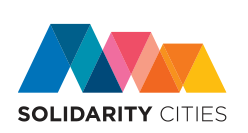Difference between revisions of "Solidarity Cities"
| (3 intermediate revisions by one other user not shown) | |||
| Line 1: | Line 1: | ||
{{Infobox | {{Infobox | ||
| − | |Image= [[File:Slogo.png| | + | |Image= [[File:Slogo.png|300px]] |
|Year of foundation= 2016 | |Year of foundation= 2016 | ||
|Region= EU | |Region= EU | ||
| Line 6: | Line 6: | ||
|Contact= silvia.ganzerla@eurocities.eu | |Contact= silvia.ganzerla@eurocities.eu | ||
}} | }} | ||
| + | What European Alternatives researchers have called Cities of Solidarity confronts the limitations of migration policies put in place by single national governments. Civil society has been organising in innovative ways, with numerous associations and networking experiences springing up all across the continent. These organisations focus on migrant reception, education and placement in the labour market as well as facilitate social integration processes. These initiatives meet, in a significant number of cases, with a willingness to cooperate on the part of local and municipal authorities. | ||
| + | |||
| + | These organisations have required the cooperation between self-organised migrant groups, informal associations and structured NGOs, on the one hand, and City governments on the other. At the same time, such cooperation has fostered new transnational networks, with relationships and connections built between single cities, with the aim of presenting shared proposals for asylum and migration policy and coordinating practical efforts in solving daily and long-term problems in the reception and social inclusion of migrants.<ref> WP6 Newsletter </ref> | ||
| − | |||
| − | |||
| − | |||
== About == | == About == | ||
Latest revision as of 11:44, 13 August 2018
| Solidarity Cities | |
|---|---|

| |
| Year of foundation | 2016 |
| Region | EU |
| Homepage | http://solidaritycities.eu/ |
| Contact | silvia.ganzerla@eurocities.eu |
What European Alternatives researchers have called Cities of Solidarity confronts the limitations of migration policies put in place by single national governments. Civil society has been organising in innovative ways, with numerous associations and networking experiences springing up all across the continent. These organisations focus on migrant reception, education and placement in the labour market as well as facilitate social integration processes. These initiatives meet, in a significant number of cases, with a willingness to cooperate on the part of local and municipal authorities.
These organisations have required the cooperation between self-organised migrant groups, informal associations and structured NGOs, on the one hand, and City governments on the other. At the same time, such cooperation has fostered new transnational networks, with relationships and connections built between single cities, with the aim of presenting shared proposals for asylum and migration policy and coordinating practical efforts in solving daily and long-term problems in the reception and social inclusion of migrants.[1]
About
"Solidarity Cities is an initiative on the management of the refugee crisis proposed by the Mayor of Athens and launched in the framework of the EUROCITIES network. It aims to constitute the framework under which all cities actions and initiatives are presented highlighting the political leadership of cities in addressing this challenge.
Cities becoming active under the Solidarity Cities initiative want to work with the European Commission and member states to manage the refugee situation. They want to abide by the principles of responsibility and solidarity as expressed in the EUROCITIES statement on asylum and the open letter from EUROCITIES politicians published on International Refugee Day, 20 June 2016.
Solidarity Cities is open to all European cities wishing to work closely with each other and committed to solidarity in the field of refugee reception and integration.
Solidarity Cities is structured around four pillars:
- information and knowledge exchange on the refugee situation in cities
- advocating for better involvement and direct funding for cities on reception and integration of refugees
- city-to-city technical and financial assistance and capacity building
- pledges by European cities to receive relocated asylum seekers" [2]
Web
References
- ↑ WP6 Newsletter
- ↑ solidaritycities.eu